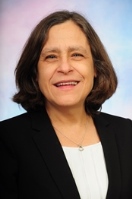
Susan Eggly, Ph.D., a member of the Population Studies and Disparities Research program and associate professor of Oncology for the Wayne State University School of Medicine and the Barbara Ann Karmanos Cancer Institute, has received a five-year, $2.9 million RO1 grant from the National Institutes of Health and National Cancer Institute to increase the participation of African-American men in prostate cancer clinical trials.
Her collaborators in "A Multilevel Intervention to Increase the Participation of African Americans in Prostate Cancer Clinical Trials" (award number 1RO1CA200718-01) include Louis A. Penner, Ph.D.; Terrance Albrecht, Ph.D.; Mark Manning, Ph.D.; Lauren Hamel, Ph.D.; and Elisabeth Heath, M.D., of Karmanos and the Wayne State University School of Medicine, and Ellen Barton, Ph.D., of Wayne State University's Department of English, and Michael Carducci, M.D., and Dina Lansey, MSN, of Johns Hopkins University's Sidney Kimmel Cancer Center in Baltimore.
"Clinical trials are necessary to make progress in preventing and treating prostate and other cancers. For clinical trials to benefit a large, diverse community, patients from many populations are needed to participate, but many minority populations are underrepresented," Dr. Eggly said. "The under-enrollment of African-Americans with prostate cancer is particularly troublesome because of the higher incidence and death rates for African-American men with this cancer, as compared to white men."
The purpose of the study is to increase rates at which African-American men with prostate cancer make an informed decision to participate in a clinical trial, based on high quality communication with their physician.
Physicians who treat patients with prostate cancer at Karmanos and the Kimmel Cancer Center will be invited to participate. African-American and white men with prostate cancer who are patients of participating physicians and who may be eligible for a trial will also be invited to participate.
Two interventions, one focused on patients and the other on physicians, will be provided. The interventions are designed to improve outcomes, including physician decisions to discuss and offer trials to their patients; patient-physician communication about trials; patient understanding of trials and decisions to participate; and ultimately, participation rates among both African-American and white men with prostate cancer.
The study's specific aims include determining the effect of the interventions, both independently and together, on outcomes; comparing the effects of the interventions on outcomes for African-American versus white men; and examining the extent to which patient-physician communication mediates the relationship between the intervention and outcomes.